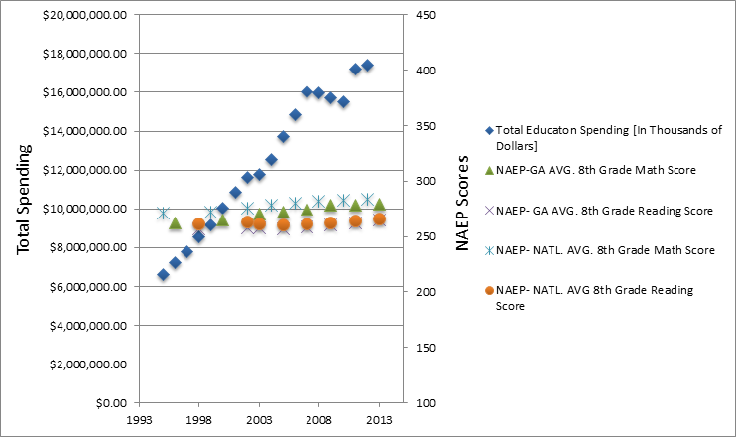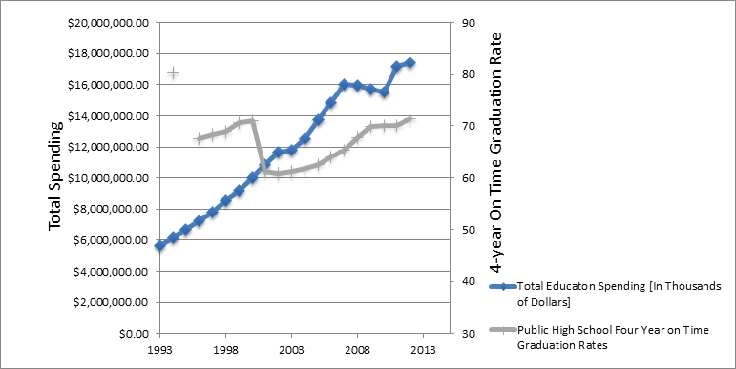by Georgia Center for Opportunity | Mar 10, 2015

While education plays a tremendous role in shaping individual life outcomes, the number of students in Georgia who do not advance beyond K-12 remains astronomically high. Over 1 in 5 young adults in Georgia are not attending school, not working, and have no degree beyond high school. Additionally, in 2014, more than 33,000 students did not graduate. Of those who go on to college, nearly 40 percent do not finish in four years.
To promote solutions that will give more Georgians a real chance to prosper, GCO convened a working group of education professionals as part of the College and Career Pathways Initiative. Comprised of K-12, postsecondary, and local business leaders, the group sought to contextualize barriers faced by students, parents, and schools of varying circumstances across the state.
Through a series of nine meetings, the group not only considered the academic needs of readiness, such as rigorous learning standards, and systemic barriers, such as recruiting and preparing quality teachers, the group also considered the philosophical underpinnings of readiness such as the relationship between education and fulfilling one’s purpose in life.
The following report serves as an overview of the themes and key issues covered by GCO’s College and Career Pathways working group. Major themes include the importance for Georgia to:
- Move away from big policy as a means of education reform
- Empower schools to take the reins of innovation and reform
- Help students develop healthy habits through strong relational ties
Through the lens of the themes described above, GCO plans to publish over the coming months a series of reports addressing key issues impacting college and career readiness in Georgia. These issues include:
- Measuring noncognitive variables in school and building small-scale relationships
- Improving accountability measures in Georgia’s schools
- Education reimagined through blended learning models
- Increasing experimentation and creativity in teacher preparation: Creating “the missing institution”
To read the full report, click here: Fortifying Pathways: Themes to Guide College and Career Readiness in Georgia
by Georgia Center for Opportunity | Mar 2, 2015

Safe Harbor/Rachel’s Law Act – sponsored by Sen. Renee Unterman, R-Buford
Georgia legislators, led by Sen. Renee Unterman, R-Buford, are seeking to tighten Georgia’s existing sex trafficking laws. The combination of Senate Bill (SB) 8 and Senate Resolution (SR) 7 would help create a new Safe Harbor for Sexually Exploited Children Fund, using new $2,500 fines on convicted traffickers and an annual $5,000 fee on adult entertainment establishments to raise money for the fund. Explaining the purpose for charging adult entertainment establishments an annual fee to raise money for this fund, SB 8 says:
“The General Assembly finds that it is necessary and appropriate to adopt uniform and reasonable fees and regulations to help address the deleterious secondary effects, including but not limited to, prostitution and sexual exploitation of children, associated with adult entertainment establishments…The General Assembly finds that a correlation exists between adult live entertainment establishments and the sexual exploitation of children. The General Assembly finds that adult live entertainment establishments present a point of access for children to come into contact with individuals seeking to sexually exploit children. The General Assembly further finds that individuals seeking to exploit children utilize adult live entertainment establishments as a means of locating children for the purpose of sexual exploitation.”
SB 8 sets out the framework of the proposal while SR 7 seeks amendment to the Georgia Constitution by asking Georgians for permission to create the new fund. A governor-appointed commission would manage this fund and the effort. The money would be used to pay for physical and mental health care, housing, education, job training, child care, legal help and other services for sexually exploited victims.
In addition to the new fines, the Bill would require convicted traffickers be listed on the state sex offender registry – something which surprisingly doesn’t happen now.
Legislators are working together to merge Unterman’s version of the proposal with a similar House version, House Bill (HB) 244, with hopes to assure final passage. The Bill passed through the Senate on a 52-3 vote, and is now working its way through the House Committee for Juvenile Justice.
by Georgia Center for Opportunity | Feb 26, 2015

I used to admire and respect Michael Bowers, Georgia’s Attorney General from 1981 to 1997, but his recent intervention in the debate over the religious freedom bills ought to embarrass him. To be sure, losing my respect won’t cost him any sleep and the mainstream media will only celebrate his move from what it regards as the wrong side of history to the right side. Still, he ought to be embarrassed because the letter he wrote against the House and Senate versions of the bill is a regrettable, albeit entirely predictable, combination of hysteria and inconsistency.
Let’s start with the hysteria. The law, he says, will provide people with an excuse for practicing invidious discrimination and enable every person to justify on the basis of religion becoming a law unto himself or herself. And as if this weren’t bad enough, Bowers invokes the spectre of the KKK returning fully garbed in hoods, a practice he alleges might well be protected by the proposed Georgia legislation.
Well, no, no, and a thousand times no.
In the first place, Bowers doesn’t actually argue that the law permits invidious discrimination; he merely asserts the following:
The proposed RFRA is nothing more than an effort to legalize discrimination against disfavored groups, requiring only the discriminating party’s assertion of a burden on his or her…purported religious belief.
I’ll explain shortly why this is an extremely misleading “explanation” of what the bill will do, but, for now, I’ll restrict myself to recounting how he reaches this conclusion. It’s all, he says, in the timing. If the Georgia legislature had taken seriously the threat to religious liberty that came from the Supreme Court’s decision in Employment Division v. Smith, why did it wait more than twenty years to do so? The answer can only be “same sex marriage.” Religious liberty is simply the fig leaf behind which those who want to deny gays and lesbians marriage equality (not to mention other sorts of equality) are going to try to hide.
I agree that timing is an issue, but not in the way Bowers insists. There is a new sense of urgency, not about protecting people’s “right” to discriminate, but rather about protecting traditional religious belief and practice from aggressive attempts to use state and judicial power to force people to conform to the new order. Some of these threats were, well, not quite unimaginable but barely on the horizon as recently as just a few years ago. Remember pro-life Michigan Democratic Congressman Bart Stupak, who supported the Affordable Care Act in exchange for an executive order reaffirming that no federal funds would pay for abortions? Just a few years later, the contraception mandate enforced by the U.S. Department of Health and Human Services violated that promise, according to a rueful Stupak. Student religious organizations have effectively been run off college campuses (not everywhere, to be sure) because they require that their officers actually share the principles of the organization. And yes, businesspeople who in other instances have been quite happy to serve their gay and lesbian customers have sought to draw the line at providing services to same-sex wedding ceremonies they don’t and can’t conscientiously support. Traditional religious believers can be excused for feeling more than a bit threatened by all these developments and thinking that more robust religious liberty protection is required.
Let me turn now to the “law unto himself or herself” canard. Here’s Bowers’ best explanation of this claim (oddly in the section of the letter supposedly devoted to his contention about invidious discrimination):
Any time a person wished to refuse to act in response to a government requirement, he or she could assert the protection of the proposed RFRA. Whether legitimate or not, a controversy would likely ensue involving law enforcement officials, school officials, hospital administrators, or other government officers, and possibly the courts. The potential undermining of the rule of law is limitless.
It seems to me that this contention proves too much, as anyone could make the same claim about the First Amendment and the Fourteenth Amendment due process clause. Does Bowers want to throw those out too, as they certainly can serve as bases for an individual refusing “to act in response to a government requirement”? The point that Bowers doesn’t ever really concede directly is that a RFRA claim isn’t an automatic trump against government action or regulation; it merely demands that government articulate a compelling state interest and that the measure proposed be the least restrictive means to achieve that interest. These questions are for a judge to decide, and the individual resisting the law or regulation may not win. The interest could indeed be compelling, as I assume prohibiting genuinely invidious discrimination might be, and the means chosen could be the least restrictive possible. The RFRA merely offers religious believers a recourse in the event that the proverbial tyrannical majority (about which James Madison worried in Federalist #10) decides that the shortest route between two points is a straight line through religious freedom. Indeed, by assuring that the law in the largest sense protects the rights government is “ordained and established” (the words of the Declaration of Independence) to protect, a RFRA actually serves to maintain public confidence in the rule of law.
And then there are the hooded knights of the KKK, which amounts to pure fear-mongering on Bowers’ behalf, something that ought to have been entirely unworthy of a former Attorney General. Given Georgia’s history, if anything is a compelling state interest, it’s keeping the KKK from hiding behind hoods as it spews its hatred.
And again—it bears repeating, since Bowers so frequently encourages misunderstanding—whether a RFRA claim stands depends not upon the individual asserting it, but upon the judge hearing the case. Of course, Bowers has to acknowledge this point, but he attempts to deprive it of its force by making what judges will do seem altogether unpredictable:
It is impossible to anticipate whether Georgia courts would follow the lead of the Eleventh Circuit and interpret the RFRA as co-extensive with First Amendment jurisprudence or whether the courts would treat RFRA as ushering in a new era of religious freedom jurisprudence that strikes down neutral laws of general applicability based on an alleged burden on the exercise of religion.
All he has is this uncertainty about what courts will do. He has to concede that other courts—state and federal—have most emphatically not permitted the parade of horribles with which he has regaled us in the letter. Indeed, one of the best reviews of our state and federal RFRA experience suggests that we have little or nothing to worry about and, indeed, much to which to look forward.
Let me conclude by offering one note of agreement with Bowers’ argument. I also worry about what judges might do, especially where religious freedom is concerned. I don’t want what some have called our first freedom to depend upon what might be the whim of a magistrate. To be sure, I try to have as high an opinion as possible of our state and federal judges, but have to confess that I have been disappointed more than a few times by their decisions and the quality of the reasoning in support of them. I wish it hadn’t come to this. I wish that popular and legislative majorities were always respectful and solicitous of the rights of those who seem to stand in their way. I wish that righteous and self-righteous indignation didn’t all too often get the better of us. I wish that we were more frequently visited by “the better angels of our nature,” as Abraham Lincoln so eloquently put it in his First Inaugural. I pray for all of this, but I’m also going to urge my representatives to vote for these pieces of legislation.
Dr. Joseph M. Knipperberg is a contributing scholar at the Georgia Center for Opportunity and Professor of Politics at Oglethorpe University.
Opinions expressed are those of the author and do not necessarily represent the opinions of Georgia Center for Opportunity.
by Georgia Center for Opportunity | Feb 24, 2015

It’s official. Governor Nathan Deal signed an executive order on February 23rd to “ban the box” on applications for state employment in Georgia. This order will remove the question about felony convictions from the initial job application and postpone it to a later point in the hiring process. This policy is intended to provide those with a criminal record a fair shot at showing employers why they are the best candidate for a job without being automatically screened from the hiring process simply because they have a felony conviction.
The Governor laid out specific hiring practices that government entities of the State of Georgia shall follow:
- Prohibit the use of a criminal record as an automatic bar to employment.
- Prevent the use of an application form that inappropriately excludes and discriminates against qualified job applicants.
- Promote the accurate use and interpretation of a criminal record.
- Provide qualified applicants with the opportunity to discuss any inaccuracies, contest the content and relevance of a criminal record, and provide information that demonstrates rehabilitation.
- Require initial disclosure on applications for sensitive governmental positions in which a criminal history would be an immediate disqualification.
Georgia is joining thirteen other states who have implemented a fair hiring policy and is the first state in the South to do so. This policy will help to remove a barrier to employment for those with a criminal record by opening up more job opportunities for which motivated returning citizens may be qualified. The state is setting the example for how county, city, and private employers could aid people leaving prison in the reintegration process by giving them a fair shot at jobs for which they are good candidates.
Georgia Center for Opportunity (GCO) applauds the important step taken by the Governor to “ban the box” as well as the efforts of all those who have been involved in working to increase employment opportunities for returning citizens in Georgia. In December 2013, GCO published a report recommending that the state “ban the box” and set the example for private employers by hiring and maintaining qualified returning citizens as employees. This recent executive order is the first step in seeing this fulfilled.
In addition, GCO is pleased to see several other recommendations from our December 2013 report currently being considered by the General Assembly or state agencies. These recommendations include offering a State Work Opportunity Tax Credit to incentivize employers to hire returning citizens, lifting professional license restrictions for those with felony convictions, and ensuring identification is secured prior to a person’s release from prison.
As Georgia continues to take positive steps forward in removing barriers to opportunity among those involved with the criminal justice system, the public should begin to see more examples of returning citizens who are not only making it in society, but flourishing.
by Georgia Center for Opportunity | Feb 23, 2015

Attempts at reforming the public education system in Georgia are not new. Even just looking over the last 20 years, numerous reform efforts have been introduced as a means to improve educational outcomes among the state’s youth. Some of these ideas have had a better effect than others, yet as a whole they have not achieved the level of progress Georgia has hoped for. While modest gains have been made in the National Assessment of Educational Progress (NAEP) scores for eighth grade students and the graduation rate for high school students has risen since 2002, Georgia still has a grade of C-Minus overall and one of the lowest graduation rates in the country.
Below is a list of reforms that Georgia has tried since the introduction of the Hope Scholarship and the charter school law that was passed in 1993. Comparing these reforms to the two graphs that follow demonstrates that achievement among Georgia’s eighth grade and high school students has been relatively stagnant compared to the amount of money spent to improve education over the last two decades.
Past Reforms
1993 – HOPE Scholarship created and funded by lottery. Charter school law passed; only public schools can convert to charters; commissioned by local and state board.
2000 – A+ Education Act mandates end-of-course assessments and Criterion-Referenced Competency Test (CRCT) in core subjects.
2001 – No Child Left Behind and Title I grants public schools with high percentages of students receiving free or reduced lunch additional federal funding.
2005 – Georgia Performance Standards implemented as a result of Quality Core Curriculum (QCC) reform to align with national standards.
2008 – HB 881 creates the Georgia Charter Schools Commission. Qualified Education Expense (QEE) Tax Credit Bill passed (HB 1183).
2009 – American Recovery Reinvestment Act; Georgia received almost $2 billion dollars to invest in education. HB555 requires local schools systems to grant charters within the district access to unoccupied buildings at no cost.
2010 – As a result of Common Core State Standards initiative, Georgia adopts new content standards in language arts, math, science, and social studies.
2011 – HB881 Georgia Charter Commission declared unconstitutional; 16 charters, 15,000 students impacted. QEE Tax Credit Bill amended (HB 325) creating student scholarship organizations (SSOs); individual and corporate taxpayers can contribute to SSOs in exchange for a state tax credit.
2012 – Amendment One passes and Georgia Charter Commission is reinstated. College and Career Performance Readiness Index (CCPRI) conducted “study year” of public schools’ performance.
2013 – Tax Credit Bill amended (HB283); cap increased to $58 million. Career Clusters curriculum implemented in schools.
2014 – Students are to take Georgia Milestones instead of CRCT and EOCT. Charter schools reach a total of 315.
- 77 start-ups
- 31 conversions
- 207 charter system schools
- 16 charter systems
- 13 state commissioned specialty schools
- 13.5% of total student population
Total Spending vs. NAEP Scores

Total Spending vs. High School Graduation Rate

It seems that Georgia will have to do something different than what has been attempted thus far if we want to experience real gains in educational outcomes among K-12 students – something different than pumping more money into the current system, aligning state curriculum to national standards, or allowing only a limited number of parents and students school choice. We need greater options that ensure tax dollars are well spent and students’ educational needs are met. Only then will be begin to see a more dramatic increase in the number of high school graduates who are ready for college, career, and life.






